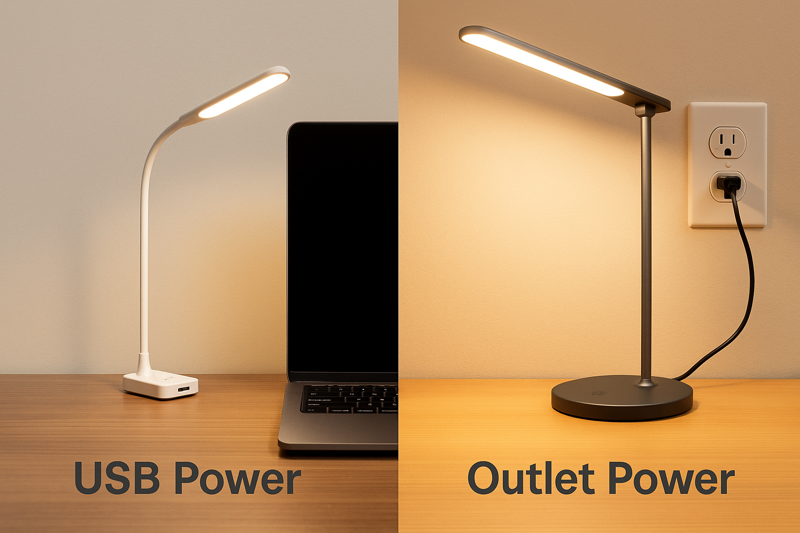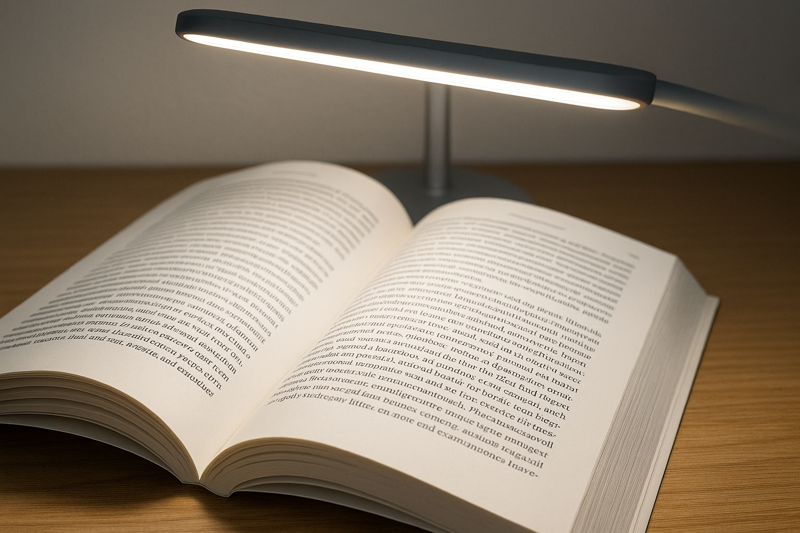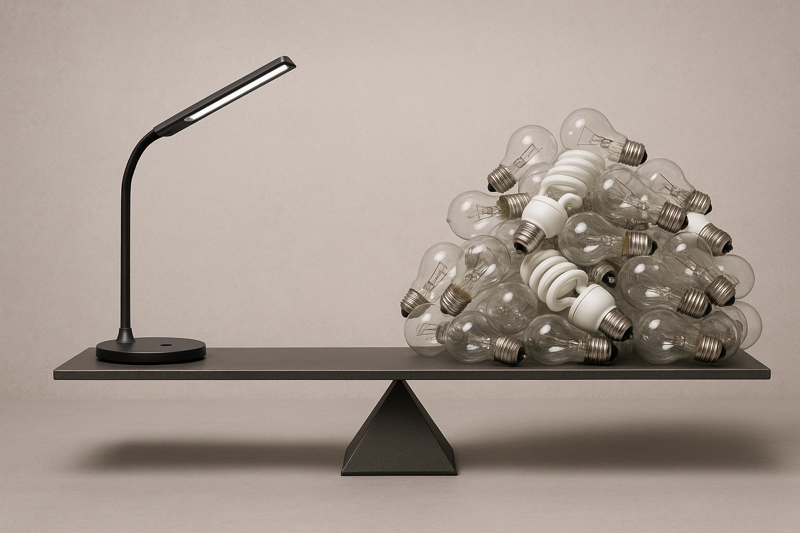
Are you struggling to find reliable sources for high-quality dimmable LED desk lamps for your business needs? Choosing the wrong supplier can lead to poor product quality, delays, and ultimately, dissatisfied customers or employees. This guide will show you the best avenues.
Businesses can source high-quality dimmable LED desk lamps directly from manufacturers, through B2B platforms, at industry trade shows, or by partnering with specialized sourcing agents for reliable procurement.
Let's explore these options so you can make an informed decision for your business.
Why Consider Sourcing Dimmable LED Desk Lamps Directly from Manufacturers?
Do you find that working with multiple intermediaries inflates costs and complicates communication? This can lead to higher prices than necessary and misunderstandings about your specific requirements, like the need for stable quality or innovative new product features. Sourcing directly from manufacturers offers a more straightforward path.
Sourcing directly from manufacturers like us at Roye Lamp can provide cost benefits, better customization options, and clearer communication, ensuring you get products matching your exact specifications.
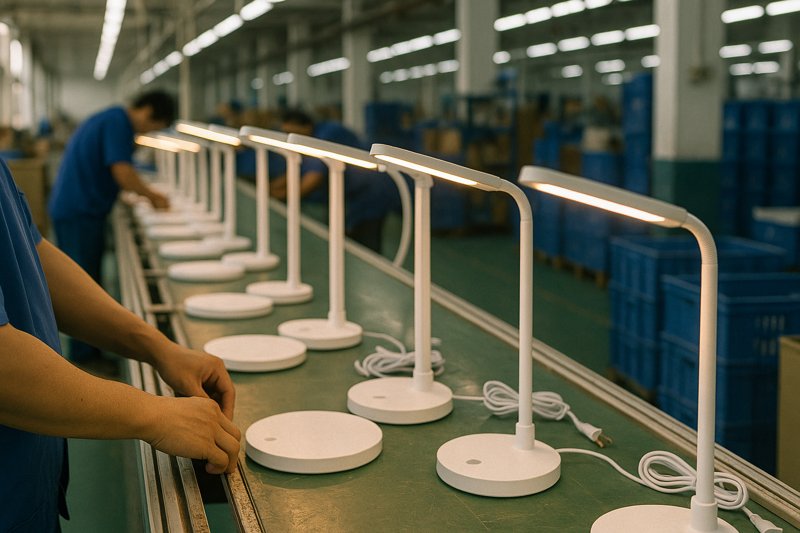
As the Marketing Manager for Roye Lamp, a company founded in 2000, I've seen firsthand the benefits our B2B clients get when they work directly with us. We are a manufacturer in China, specializing in products like intelligent LED desk lamps, eye-caring desk lamps, and study lamps. Our typical customers, often Owners, Product Managers, or Buyers, are looking for a reliable supplier. One of their key pain points is ensuring stable quality and competitive prices, which direct sourcing helps address.
Benefits of Direct Manufacturing Partnerships1
When you deal directly with a manufacturer, you bypass several layers of middlemen. This often means better pricing because there are fewer markups. More importantly, you have a direct line of communication2 with the people actually making the product. This is crucial when you have specific design requirements, need particular features, or want to ensure certain quality standards are met. For example, our clients from The United States, The United Kingdom, and the Netherlands often have precise needs for their markets. Direct communication helps us meet those needs effectively. We can discuss our R&D capabilities3 and how we develop hundreds of new products each year, some with national invention patents.
Finding and Vetting Reliable Manufacturers
Finding a good manufacturer involves research. You can use online searches (like Google, which many of our customers use), industry directories, or referrals. Once you identify potential manufacturers, vetting them is critical. Look for:
- Experience and Reputation: How long have they been in business? What do other clients say?
- Certifications: Do they have quality management system certifications like ISO9001 (which Roye Lamp has), or product safety certifications like CE, ROHS, GS, CCC relevant to your market? We also hold ISO141001 and OHSAS18001.
- Production Capacity: Can they handle your order volume and meet lead times? This is a common pain point we aim to solve.
- R&D Capabilities: Can they offer new models or customize products? Independent innovation is our core competitiveness.
Key Considerations for Direct Sourcing
| Aspect | Direct Sourcing from Manufacturer (e.g., Roye Lamp) | Sourcing via Wholesaler/Distributor |
|---|---|---|
| Price | Potentially lower (fewer markups) | Higher (includes intermediary margins) |
| Customization | High (direct discussion of design/features) | Limited (usually off-the-shelf products) |
| Communication | Direct, clearer, faster for technical details | Indirect, can lead to misunderstandings |
| MOQs | Often higher | Generally lower |
| Quality Control | More direct involvement possible (factory audits, etc.) | Reliant on wholesaler's QC processes |
| Lead Time | Can be longer due to production scheduling | Can be shorter if stock is available locally |
| Relationship | Potential for strong, long-term partnership | More transactional |
My experience at Roye Lamp shows that building a direct relationship helps overcome many common purchasing pain points, such as quality problems and communication issues. It allows us to truly understand what the Owner or Buyer needs.
How Can B2B Platforms and Online Marketplaces Streamline Sourcing?
Does the thought of manually searching for and contacting individual LED desk lamp suppliers feel overwhelming and inefficient? It's hard to quickly compare many options or find new, innovative suppliers beyond your existing network using old methods. B2B platforms offer a more consolidated approach.
B2B platforms and online marketplaces offer a centralized, efficient way for businesses to discover, compare, and connect with a wide range of dimmable LED desk lamp suppliers globally.
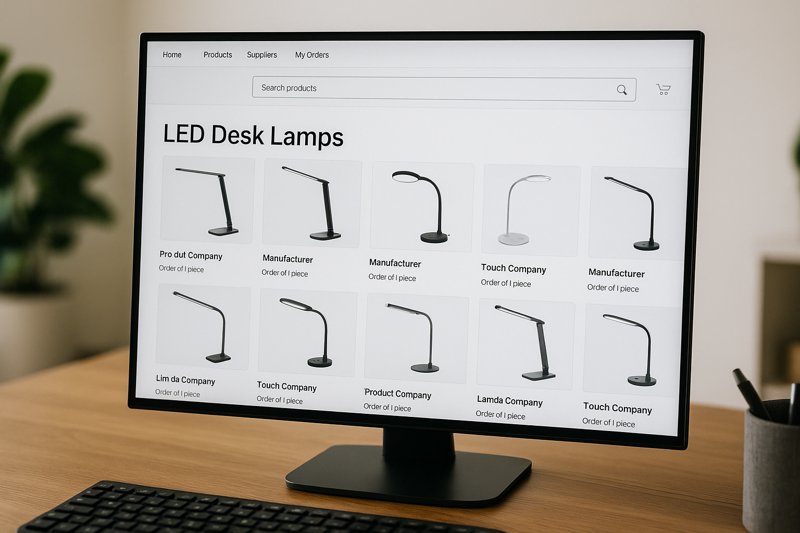
Many of our potential customers, including Product Managers and Buyers, use methods like Google and social media to find suppliers. B2B platforms are essentially large-scale digital marketplaces that aggregate many suppliers, including manufacturers like Roye Lamp. This makes the initial discovery phase much easier.
Popular B2B Platforms for Lighting Products
Several well-known B2B platforms list lighting manufacturers and suppliers. Some of the most prominent ones include Alibaba, Global Sources, and Made-in-China.com. These platforms host company profiles, product catalogs, and often, supplier verification details. For businesses in The United States or The United Kingdom looking for suppliers in China, these platforms can be a good starting point. You can find manufacturers offering a wide range of products, from basic study lamps to advanced eye-caring desk lamps with features like wireless charging.
Tips for Effective Sourcing on B2B Platforms
While B2B platforms are convenient, due diligence is still essential.
- Verify Supplier Credentials: Look for verified supplier badges, years in business, and any third-party audit reports available on the platform.
- Check Reviews and Ratings: See what other buyers have said about their experience with the supplier regarding quality, communication, and lead time.
- Communicate Clearly: Be very specific about your requirements, including product features, quality standards (like stable quality), and desired certifications (CE, ROHS, etc.).
- Request Samples: Before placing a large order, always request samples to assess the quality and functionality of the dimmable LED desk lamps firsthand. This is crucial to avoid potential quality problems.
- Negotiate Terms: Discuss MOQs (Minimum Order Quantities), pricing, payment terms, and shipping options.
Pros and Cons of Using B2B Platforms
| Pros of B2B Platforms | Cons of B2B Platforms |
|---|---|
| Access to a vast number of global suppliers | Quality can vary significantly among listed suppliers |
| Easy to compare products and initial prices | Risk of encountering inexperienced or unreliable sellers |
| Convenient for initial contact and inquiry | Communication can sometimes be challenging (language, etc.) |
| Can discover new and niche manufacturers | Information provided might not always be fully accurate |
| Often provide some level of supplier verification | Difficult to build deep, personal supplier relationships |
As a Marketing Manager at Roye Lamp, we ensure our presence on relevant platforms is accurate and highlights our strengths, such as our advanced R&D capabilities and commitment to competitive price with stable quality. Our goal is to be a reliable supplier for businesses finding us through these channels.
What Advantages Do Trade Shows and Lighting Fairs Offer for Sourcing?
Do you find it hard to truly assess product quality and a supplier's capabilities just by looking at pictures and descriptions online? You miss the chance to physically inspect products or build meaningful, face-to-face relationships with potential partners. Trade shows and lighting fairs bridge this gap.
Trade shows and lighting fairs provide invaluable opportunities to physically examine dimmable LED desk lamps, meet suppliers in person, and discover the latest industry innovations directly.
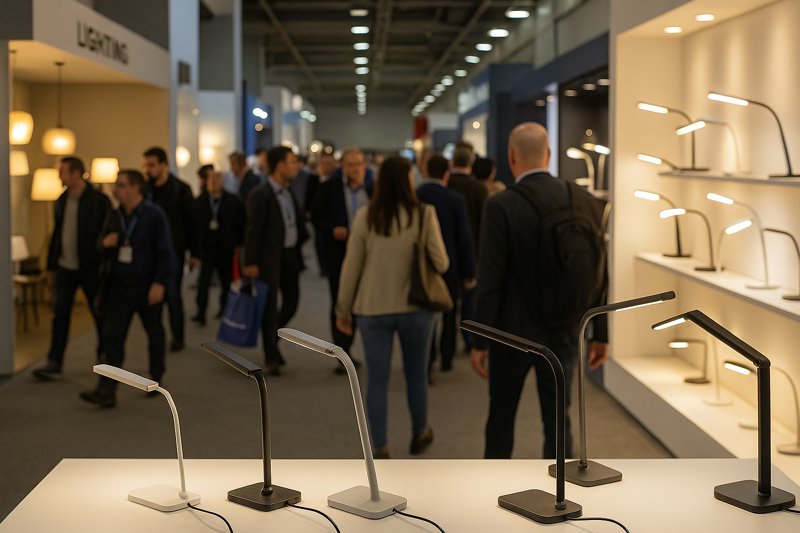
At Roye Lamp, we actively participate in Lighting Fairs. It's one of our key promotion channels. These events are crucial for us to showcase our new models, like our intelligent LED desk lamps and wireless charging LED lights, and to connect with potential customers, including Owners, CEOs, and Product Managers from around the world, including our main export countries like the USA and UK.
The Value of In-Person Interaction and Product Evaluation
There's no substitute for seeing and touching a product. At a trade show, you can:
- Assess Build Quality4: Directly evaluate the materials, finish, and overall construction of the desk lamps.
- Test Functionality5: Try out the dimming controls, adjustability, color temperature settings (if available), and other features.
- Discuss Specific Needs6: Have detailed conversations with company representatives about your requirements, potential customizations, and their R&D capabilities.
- Gauge Company Professionalism: Observe how the company presents itself and interacts with visitors.
I've had many productive conversations with Buyers at these fairs. They often come with specific pain points from previous suppliers, like quality problems or outdated product lines. Seeing our new products and talking to our team directly gives them confidence.
Discovering Innovation and Trends
Lighting fairs are where manufacturers, like Roye Lamp, often launch their latest innovations. You can see emerging trends in design, technology (e.g., smart features, eye-caring technology), and materials. This helps you find suppliers who are at the forefront of the industry and can offer advanced products. Our commitment to independent innovation means we usually have something new to show.
Key Information to Gather at Trade Shows
| Information Category | Specific Details to Look For | Why It's Important for Sourcing |
|---|---|---|
| Product Quality | Materials, finish, durability, functionality, lumen output, CRI | Ensures the product meets your standards |
| Company Capabilities | Certifications (ISO, CE, ROHS), R&D strength, production capacity, experience in your market | Vetting supplier reliability and expertise |
| New Products/Trends | Latest designs, smart features, energy efficiency, eye-care tech | Keeping your offerings competitive and innovative |
| Pricing & Terms | Ballpark pricing for volume orders, MOQs, lead times, sample policies | Assessing commercial viability |
| Contact Information | Key sales/technical contacts, factory address | For follow-up and potential factory visits |
Attending a lighting fair, well-prepared with your requirements, allows you to efficiently meet many potential suppliers and assess their offerings in a short period. It's a key method for finding a reliable supplier with advanced R&D capabilities.
When Should Businesses Consider Using Sourcing Agents or Consultants?
Is the complexity of international sourcing, especially with potential language barriers or unfamiliar business cultures, a concern for your business? You might lack the on-the-ground resources or expertise to effectively manage quality control, logistics, and supplier negotiations in a distant country like China. Sourcing agents can help.
Businesses should consider using sourcing agents or consultants when they need localized expertise, assistance with quality control, or help navigating the complexities of international procurement, especially in unfamiliar markets.

While Roye Lamp, as a manufacturer, works directly with many B2B clients, we also understand that some businesses prefer the support of a sourcing agent, especially if they are new to sourcing from China or have very specific, complex needs. These agents can help address pain points like communication difficulties or ensuring consistent lead times.
Roles and Responsibilities of a Sourcing Agent
A good sourcing agent acts as your representative on the ground. Their services can include:
- Supplier Identification and Vetting: Finding and pre-qualifying potential manufacturers based on your criteria.
- Price Negotiation: Using their local market knowledge to negotiate better terms.
- Sample Management: Arranging and checking product samples.
- Quality Control: Conducting factory audits and pre-shipment inspections to ensure products meet your standards. This is vital for ensuring stable quality.
- Logistics and Shipping: Managing the shipping process from the factory to your destination.
- Communication: Bridging language and cultural gaps with suppliers.
When is a Sourcing Agent Most Beneficial?
Using a sourcing agent might be particularly helpful if:
- You are new to international sourcing.
- You lack the time or resources to manage the process yourself.
- You are sourcing highly customized or complex products.
- You need stringent quality control in a region where you don't have a presence.
- You face significant language or cultural barriers.
My typical customer, often an Owner or Product Manager, looks for reliable suppliers. If they feel overwhelmed by the direct sourcing process, an agent can provide that layer of reliability and oversight.
Selecting the Right Sourcing Partner
| Factor to Consider | Why It's Important | Questions to Ask Potential Agents |
|---|---|---|
| Experience & Specialization | Agent should understand your product category (e.g., LED lighting) and market (e.g., China). | How long have you sourced LED lamps? References? |
| Transparency & Fees | Clear fee structure, no hidden commissions from factories. | How are you compensated? Can I see factory invoices? |
| Communication Skills | Agent must communicate effectively with you and suppliers. | How will you keep me updated? Who is my main contact? |
| Location & Network | Proximity to manufacturing hubs, strong supplier network. | Where are you based? How do you find suppliers? |
| Quality Control Process | Robust QC procedures, clear inspection protocols. | What is your QC process? Can I see sample reports? |
While sourcing agents add a cost, their expertise can save you money and headaches in the long run by preventing costly mistakes, ensuring quality, and streamlining the procurement of products like our desk lamps or eye-caring desk lamps.
Conclusion
Effectively sourcing dimmable LED desk lamps involves exploring direct manufacturing, B2B platforms, trade shows, or sourcing agents to find quality and reliability.
-
Explore this link to understand how direct partnerships can enhance pricing, communication, and product quality. ↩
-
Discover why direct communication with manufacturers is vital for meeting specific design and quality requirements. ↩
-
Learn how strong R&D capabilities can lead to innovative products and patents in the manufacturing sector. ↩
-
Understanding build quality is crucial for making informed purchasing decisions. Explore this link to learn more about its importance. ↩
-
Testing functionality firsthand allows you to experience the product's performance. Discover why this is vital for buyers. ↩
-
Engaging with representatives can lead to tailored solutions and better products. Find out how this interaction can benefit you. ↩


